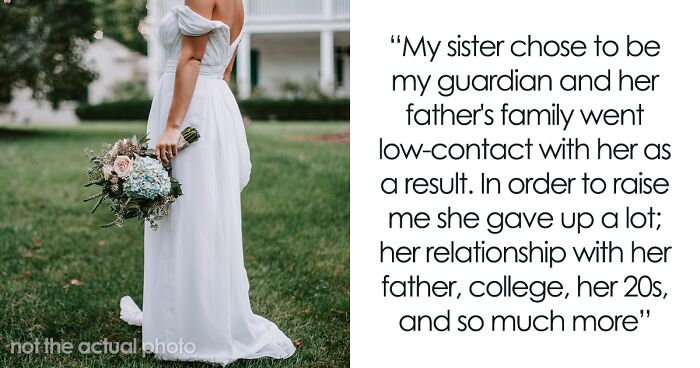
23 Y.O. Wants Her Half-Sister To Take Her Down The Aisle As She Practically Raised Her, In-Laws Say It’s Inappropriate
In ancient times, a person did not have people more important and significant than representatives of their kin, because they were always people who were ready to help, support and, if necessary, defend. A lot of time has passed since then, we all have changed, our morality has changed – but all the same, relatives remain those whom we always rely on.
Yes, sometimes there are cases when even the closest people in blood turn out to be far from being so close in spirit, and sometimes they even betray us behind our backs. But it often happens the other way around – when our family members do so much for us that we want to emphasize their contribution to our lives as much as possible – as the user u/nosleepbeauty did in her recent Reddit post.
The author of the post was raised by her older sister since 10, and is incredibly grateful for this
Image credits: Leah Kelley (not the actual image)
When the author got engaged, she asked the sister not only to be her MOH but to walk her down the aisle as well
Image credits: u/nosleepbeauty
Image credits: Asad Photo Maldives (not the actual image)
Image credits: u/nosleepbeauty
However, the future in-laws turned out to be traditionalists, so they demanded that the groom’s dad be this person
Image credits: Mikhail Nilov (not the actual image)
Image credits: u/nosleepbeauty
The bride-to-be, in her turn, was totally adamant, deciding it was her hill to die on
So, the Original Poster (OP) is now 23 years old, her half-sister is nine years older, and life decreed that there is no person closer and dearer in the life of the author of the post than this woman. Their common mother passed away thirteen years ago, and the OP never met her biological father. As a result, the 19 Y.O. older sister replaced both parents for the 10 Y.O. girl, and was so imbued with the importance of her new mission that she even had little contact with her own dad and his family.
Years passed, and the sister did her best to bring up the OP as decently as possible, to surround her with calmness, comfort and love. As the author of the post herself admits, “in order to raise me she gave up a lot: her relationship with her father, college, her 20s, and so much more.” It’s no surprise that when recently, the author got engaged, she didn’t have any questions about who should be the MOH at her upcoming wedding.
The problem was something else. Since the OP, as we have already noted, never met her own dad, it was necessary to decide who would lead her to the altar. The groom suggested the candidacy of his father, but the bride was so grateful to her elder sister for everything she had done for her that she firmly stated that she wanted only her sister to walk her down the aisle.
And this is where the controversy erupted. Firstly, the future in-laws, and the groom himself, turned out to be adherents to tradition, so they believed that walking the bride down the aisle was an exclusively male privilege. And secondly, as the bride-to-be says, it is the groom’s parents who fund about three-quarters of the wedding costs, so they were perhaps guided by the principle “who pays gets the final say.” Moreover, the understanding and kind sister herself said that in order to avoid conflict, she was ready to cede this right to the future FIL. But the original poster was adamant, not wanting to give in on this one.
Image credits: Trung Nguyen (not the actual image)
Yes, historically, it was the fathers who were always walking the daughters down the aisle, but if we dive into the history of the issue, we will find a lot of interesting facts. “This custom stems from the days of arranged marriages when a father’s looming presence was a good way to prevent the groom from backing out,” explains wedding historian Susan Wagoner in her interview to Brides.com. “In those times a bride was ‘a financial liability’ who was essentially transferred from the household of her father to that of the groom and, sometimes, that led to hesitation that got the best of grooms at the last minute.”
Today, in modern society, when the father leads the bride to the altar, it is more likely not about the practical aspect, but simply about symbolism, when parents do not “give away” the daughter, but “let her go.” Suffice it to recall, for example, the good old comedy The Father of the Bride and the experiences of Steve Martin’s character. In any case, today there are no hard restrictions on who can be this person (and whether they are needed at all).
Moreover, loverly.com has a whole list of people who can walk the bride down the aisle – from mom, one of the relatives or sister to the groom himself, or even the opportunity to walk to the altar in splendid isolation. In other words, the modern cultural paradigm is incredibly flexible, so the newlyweds – and only they – should choose.
People in the comments mainly agree with this and rightly point out that just because something is done one way does not mean it cannot be done in a different way. In any case, according to some of the commenters, this situation quite clearly shows the author of the post how the man with whom she plans to connect her life sees gender roles. And after all, as many folks in the comments claim, “this is a hill to die on.” By the way, what do you think?
People in the comments massively sided with the bride-to-be, praising her incredible sister as well
Explore more of these tags
The fact that the groom-to-be is prioritizing "tradition" and his family's wishes over his future bride's looks a lot like a red flag. Especially when it would replace something infinitely meaningful to the bride with something utterly meaningless. He seems to be more interested in keeping up appearances than in the happiness of his future wife.
This! It's so weird they said she was prioritizing her sister over him, when it was something SHE wanted at HER wedding. It's also just so weird that he knew enough about their relationship to ask the sister for her hand, but then think the sister giving her away was weird?
Load More Replies...OP needs to really stop and consider if this is the right union for her. I feel uneasy about the future husband putting "tradition" before his future wife's feelings. Tradition held back women for centuries, and this one seems pretty misogynistic to me. Also, I don't understand this attitude of "parents are paying x amount to the wedding therefore they get to make choices". Of course, paying or not parents can have opinions, but is the money a gift or is it a gift with ties - ie having to accept their decision over yours.
Actually, when I saw they were paying for 75% of the wedding, that’s just asking for trouble. It’s like when they want to buy the dress for the bride, you bet they’re going to have an opinion and will remind the bride who’s paying for it. Money for the wedding often becomes a control issue. “We’re paying for most of the wedding, so……”. Also, she needs to remember that she’s not just marrying him, she’s obviously also marrying this family. I’d be really thinking about this. It’s a red flag on him and a red flag on his family. If it’s starting out like this, be prepared that it’s going to be like this after, and probably worse.
Load More Replies...This seems to be issues around control. This is your part in the wedding and you get to cast whomever you'd like to fulfill the appointed roles based on what they mean to you and what you want to convey.
The fact that the groom-to-be is prioritizing "tradition" and his family's wishes over his future bride's looks a lot like a red flag. Especially when it would replace something infinitely meaningful to the bride with something utterly meaningless. He seems to be more interested in keeping up appearances than in the happiness of his future wife.
This! It's so weird they said she was prioritizing her sister over him, when it was something SHE wanted at HER wedding. It's also just so weird that he knew enough about their relationship to ask the sister for her hand, but then think the sister giving her away was weird?
Load More Replies...OP needs to really stop and consider if this is the right union for her. I feel uneasy about the future husband putting "tradition" before his future wife's feelings. Tradition held back women for centuries, and this one seems pretty misogynistic to me. Also, I don't understand this attitude of "parents are paying x amount to the wedding therefore they get to make choices". Of course, paying or not parents can have opinions, but is the money a gift or is it a gift with ties - ie having to accept their decision over yours.
Actually, when I saw they were paying for 75% of the wedding, that’s just asking for trouble. It’s like when they want to buy the dress for the bride, you bet they’re going to have an opinion and will remind the bride who’s paying for it. Money for the wedding often becomes a control issue. “We’re paying for most of the wedding, so……”. Also, she needs to remember that she’s not just marrying him, she’s obviously also marrying this family. I’d be really thinking about this. It’s a red flag on him and a red flag on his family. If it’s starting out like this, be prepared that it’s going to be like this after, and probably worse.
Load More Replies...This seems to be issues around control. This is your part in the wedding and you get to cast whomever you'd like to fulfill the appointed roles based on what they mean to you and what you want to convey.

 Dark Mode
Dark Mode 

 No fees, cancel anytime
No fees, cancel anytime 







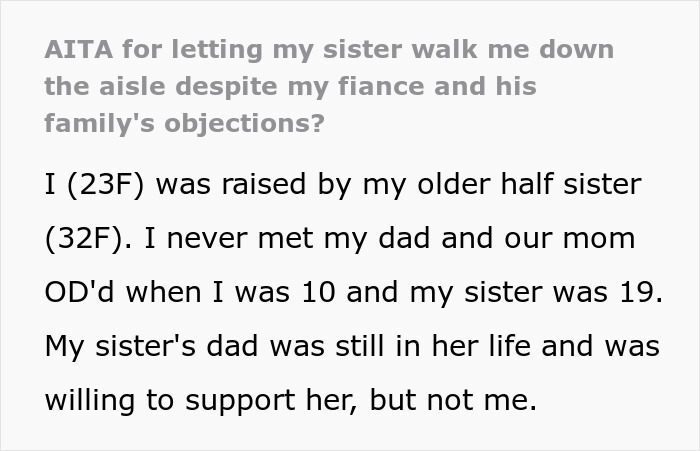
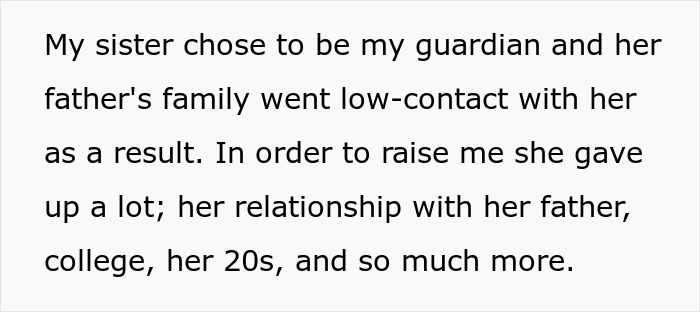
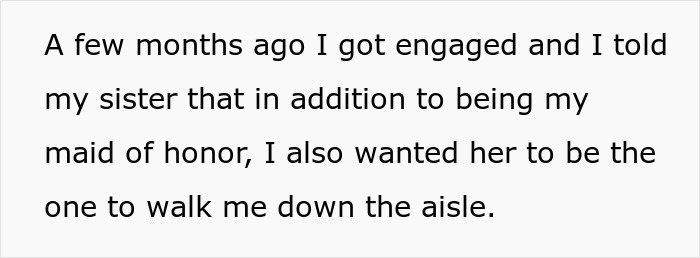

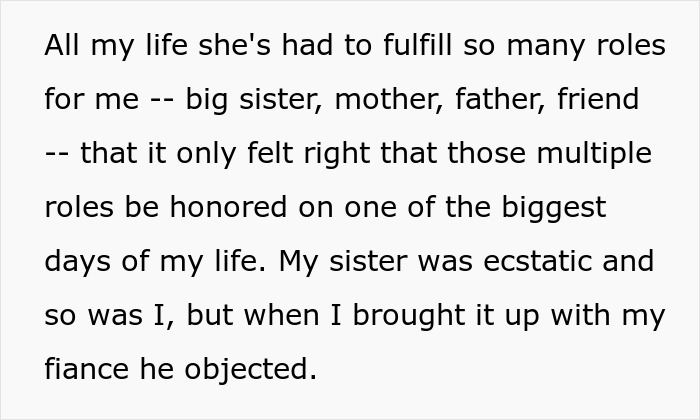

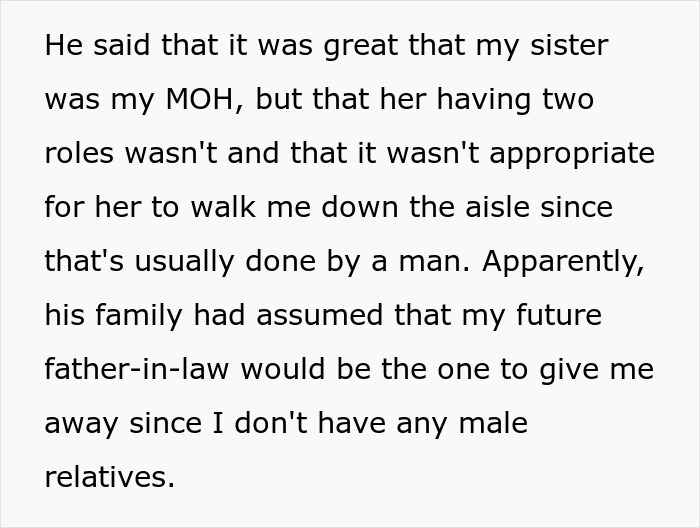
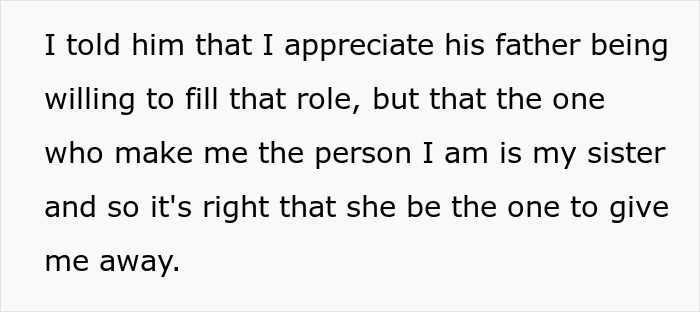
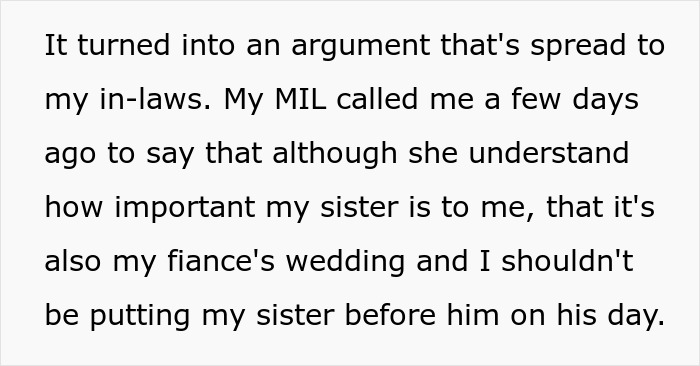
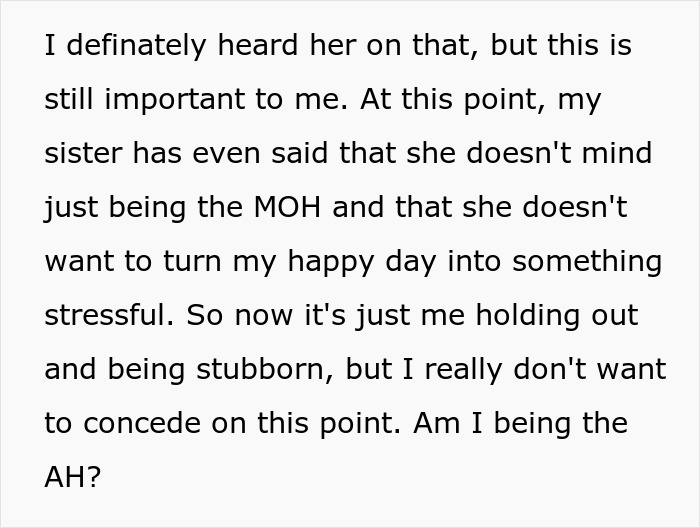




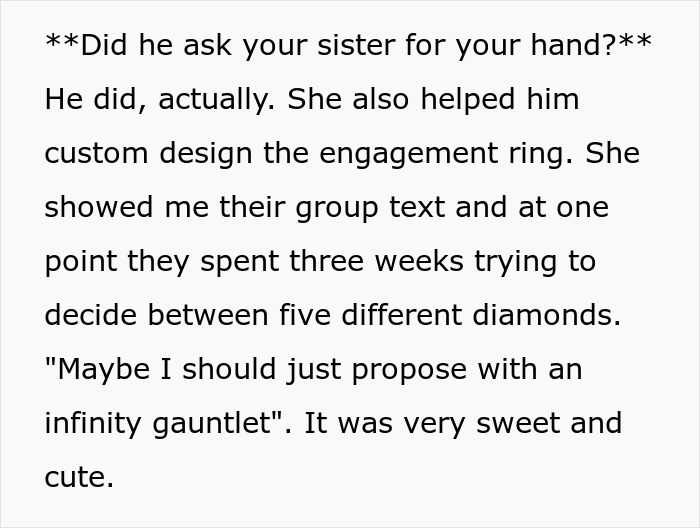

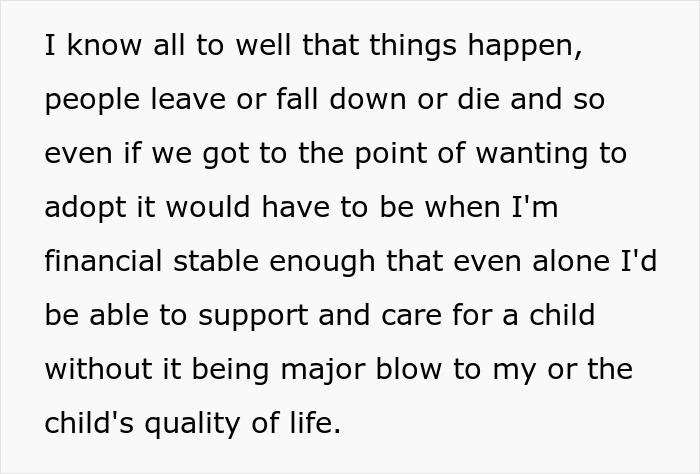




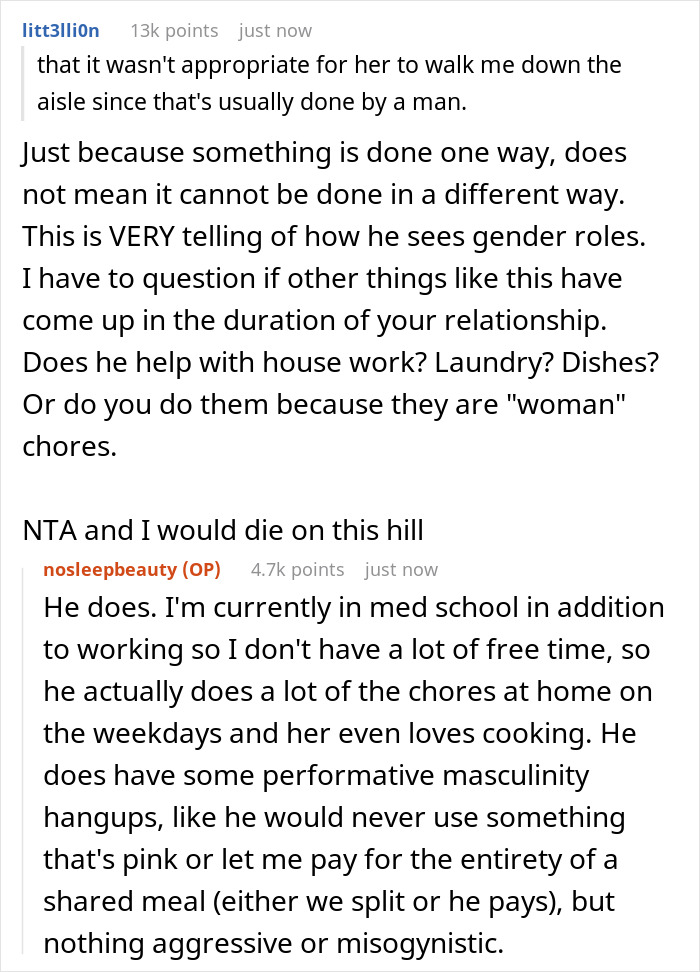
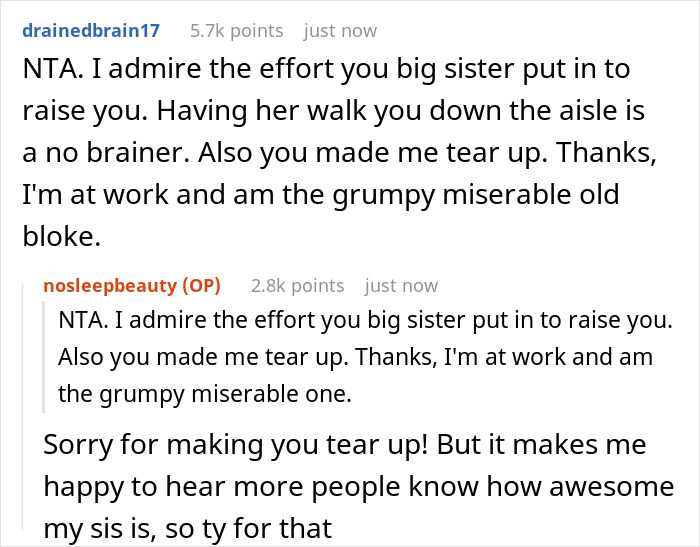
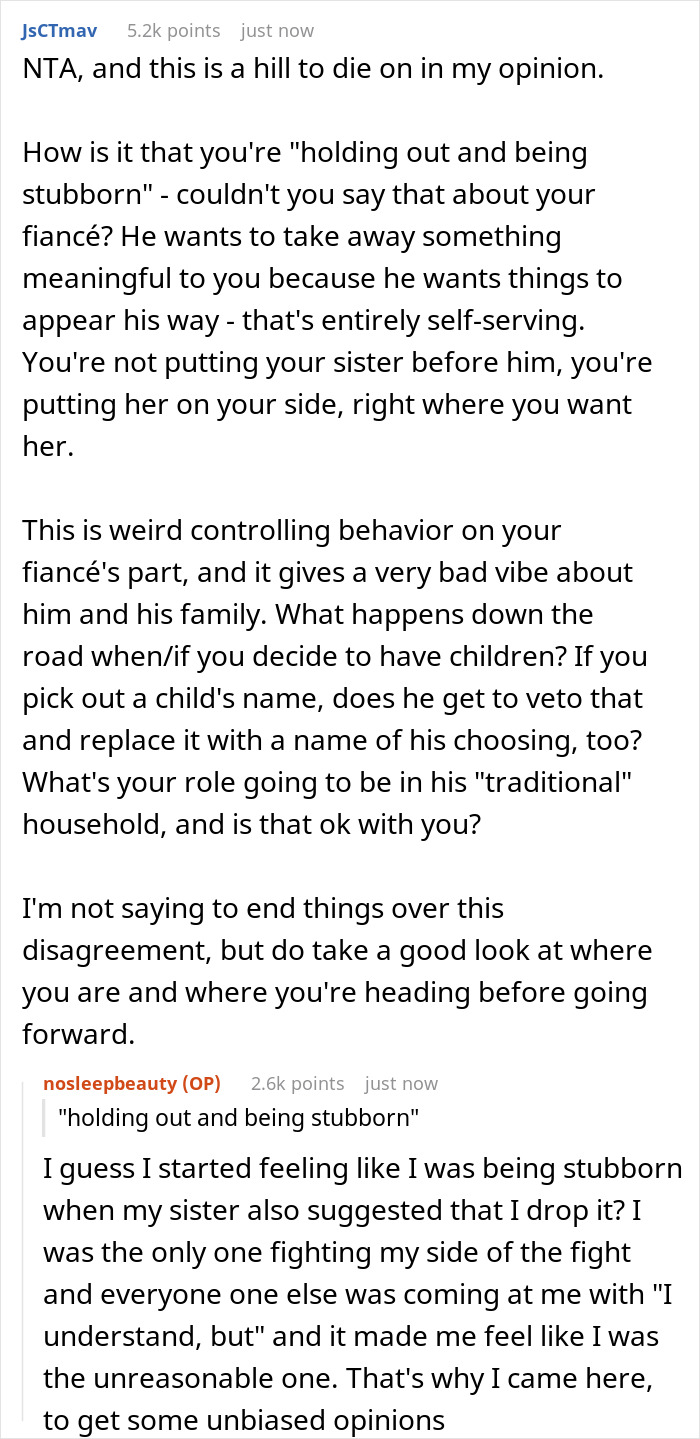

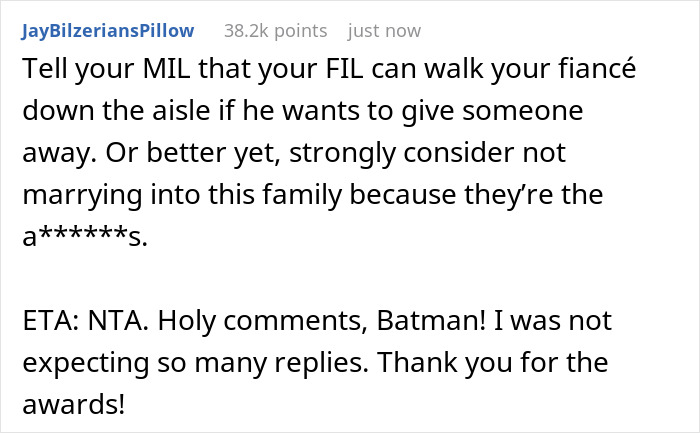
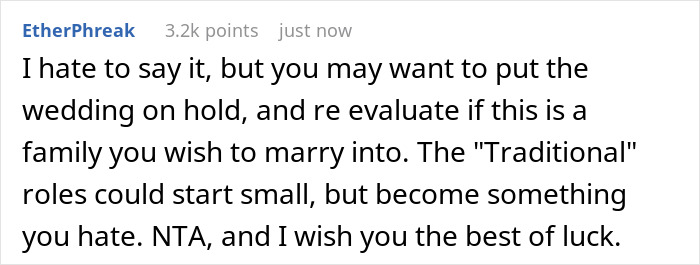















































118
89